The lab-grown heart cells have shown that they contained the key components necessary for the entry of the SARS-CoV-2 virus into the cells – the ACE2 receptor.
‘COVID-19-related heart damage can be prevented using lab-grown beating heart cells that help identify potential drugs. Scientists used this lab model to identify an effective drug called DX600 (an ACE2 antibody) that shows a better reduction of the Covid-19 infection.
’
Potential Drug against COVID-19
These beating heart cells in the lab efficiently mimic the vulnerability of the heart to SARS-CoV-2 infection. The study team utilized this setup to explore the potential of an experimental peptide drug called DX600 in preventing the entry of the virus into the heart cells.
DX600 is an ACE2 antibody that has shown seven times more significant reduction of the SARS-CoV-2 infection when compared to other antibodies. The drug easily neutralizes the pseudotyped virus in the lab by specifically targeting the ACE2.
This inhibits the activity of peptides that play a role in allowing the virus to break into the cell. The drug also did not affect the number of heart cells, implying that it would be unlikely to be toxic.
“The spike protein is like a key that fits into the ‘lock’ on the surface of the cells – the ACE2 receptor – allowing it entry. DX600 acts like gum, jamming the lock’s mechanism, making it much more difficult for the key to turn and unlock the cell door. We need to do further research on this drug, but it could provide us with a new treatment to help reduce harm to the heart in patients recently infected with the virus, particularly those who already have underlying heart conditions or who have not been vaccinated. We believe it may also help reduce the symptoms of long COVID,” says Professor Anthony Davenport from the Department of Medicine and a fellow at St Catharine’s College, Cambridge.
Source: Medindia



